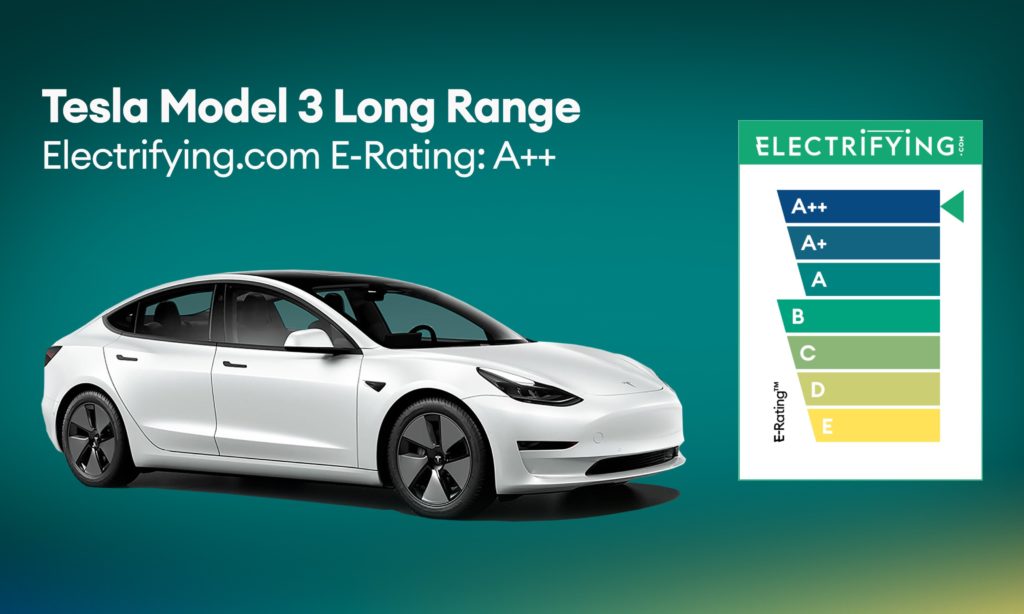Tesla Leads New Electric Vehicle Rating
Friday, 17. December 2021
An industry-standard figure to help buyers understand the overall efficiency of an electric vehicle (EV) has been launched by Electrifying.com.
The E-Rating algorithm considers several factors, including how well electrical power is converted into miles on the road, the speed at which the battery can be recharged and features such as heat pumps, intelligent brake energy recuperation and climate control preconditioning that all help to minimise power use.
The EV is scored from ‘A++’ down to ‘E’, with the BMW i4 and Tesla Model 3 considered the most efficient models available in the UK with maximum A++ ratings.

The Mercedes EQS, Citroen Ami and e-C4, and SEAT Mii are among 13 models to reach A+ ratings, with a further 14 performing well enough to achieve an A.
At the other end of the scale, the Mercedes EQV people carrier is the only vehicle to obtain an E. The Audi e-tron and Mercedes EQC luxury SUVs were rated D.
Looking at the miles per kWh alone, Electrifying.com calculated the cost difference to cover 10,000 miles between an ‘A++’ rated car (the BMW i4) and a car graded ‘E’ (Mercedes EQV) to be £580.
While the Mercedes and BMW are not competing in the same class, there are still big differences between electric cars which are direct rivals. For example, a Tesla Model Y (rated A+) will cost £176 less over 10,000 miles than a Volvo XC40 Recharge.
Besides the extra cost, owners will find themselves waiting for a charge much longer in the least efficient cars – partly because they use more energy to move, but also because they can take charge at a slower rate, says Electrifying.com.
A Vauxhall Mokka can take on power at twice the speed of a Mazda MX-30, for example, while the newest Hyundai and Kia models can add 60 miles of range in under five minutes.
Electrifying.com says that the E-Rating brings the car industry in line with other consumer sectors and has undergone stringent verification and testing by independent experts.
Ginny Buckley, founder of Electrifying.com, said: “It amazes me that until now we haven’t had an effective efficiency standard for electric cars, as we do across other sectors, but we’ve looked to put this right.
“As electricity costs less than petrol or diesel, it is easy to dismiss the efficiency of electric cars and think it isn’t important. But the costs of a less efficient model can soon add up.
“Perhaps more importantly, an electric car that is more frugal will go further and spend less time charging, meaning greater convenience for consumers.
“At Electrifying.com we’ve made it our mission to help present consumers with genuinely useful jargon-free information so they can choose the best electric car for them. E-Rating will not only help consumers but also car brands who want to hone their vehicles.”
Vehicle models rating according to Electrifying.com’s E-Rating
| Make & Model | Efficiency Rating |
| Tesla Model 3 | A++ |
| BMW i4 | A++ |
| Hyundai Ioniq | A+ |
| Citroen e-C4 | A+ |
| Fiat 500e | A+ |
| Hyundai Kona Electric | A+ |
| Mercedes EQS | A+ |
| Kia EV6 | A+ |
| Peugeot e208 | A+ |
| Seat Mii | A+ |
| Tesla Model Y | A+ |
| Vauxhall Corsa-e | A+ |
| Citroen Ami | A+ |
| Volkswagen ID.3 | A+ |
| Renault Twizy | A+ |
| Hyundai IONIQ5 | A+ |
| Audi e-tron | D |
| Mercedes EQC | D |
| Mercedes EQV | E |
By Graham Hill thanks to Fleet News